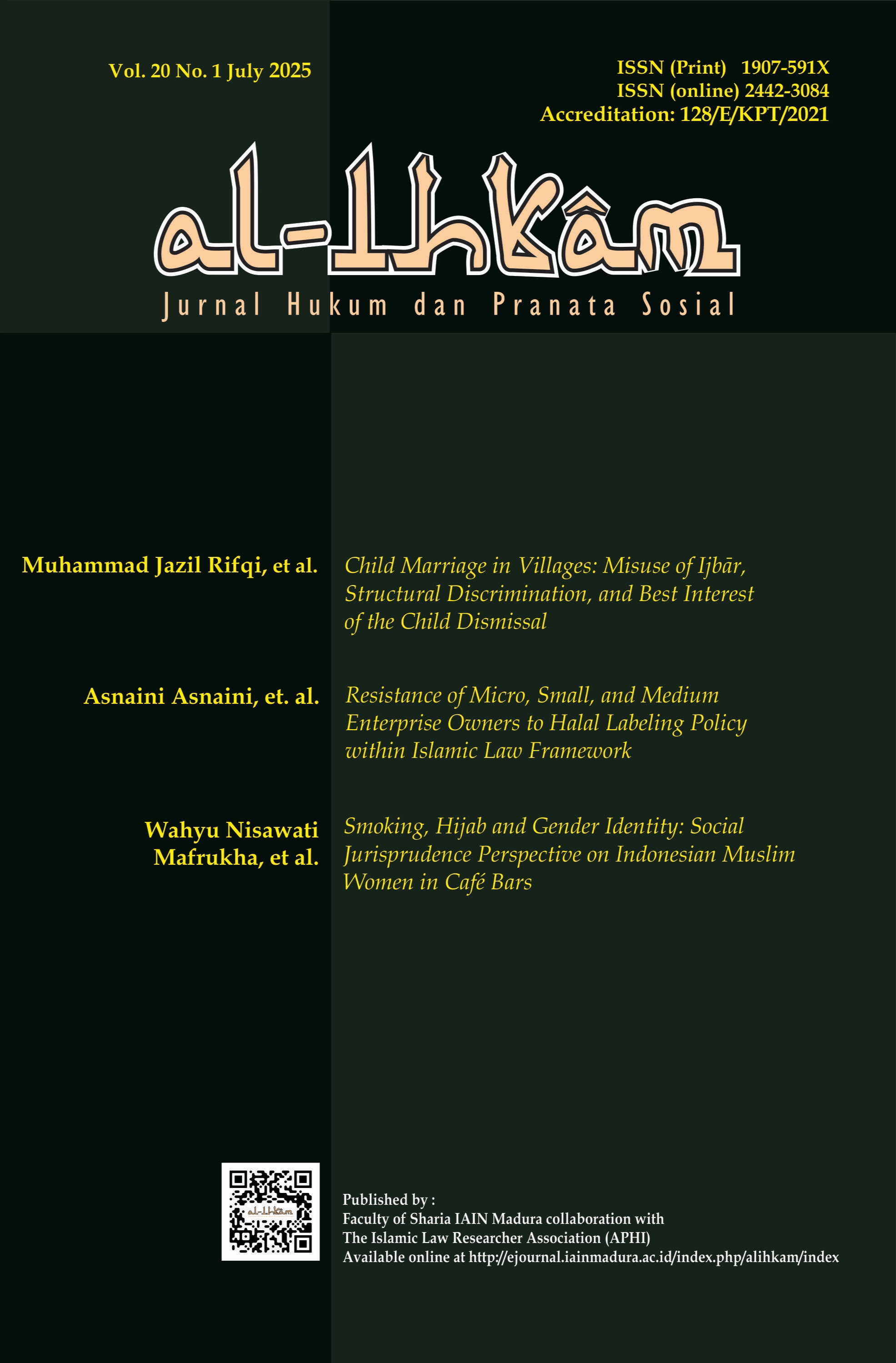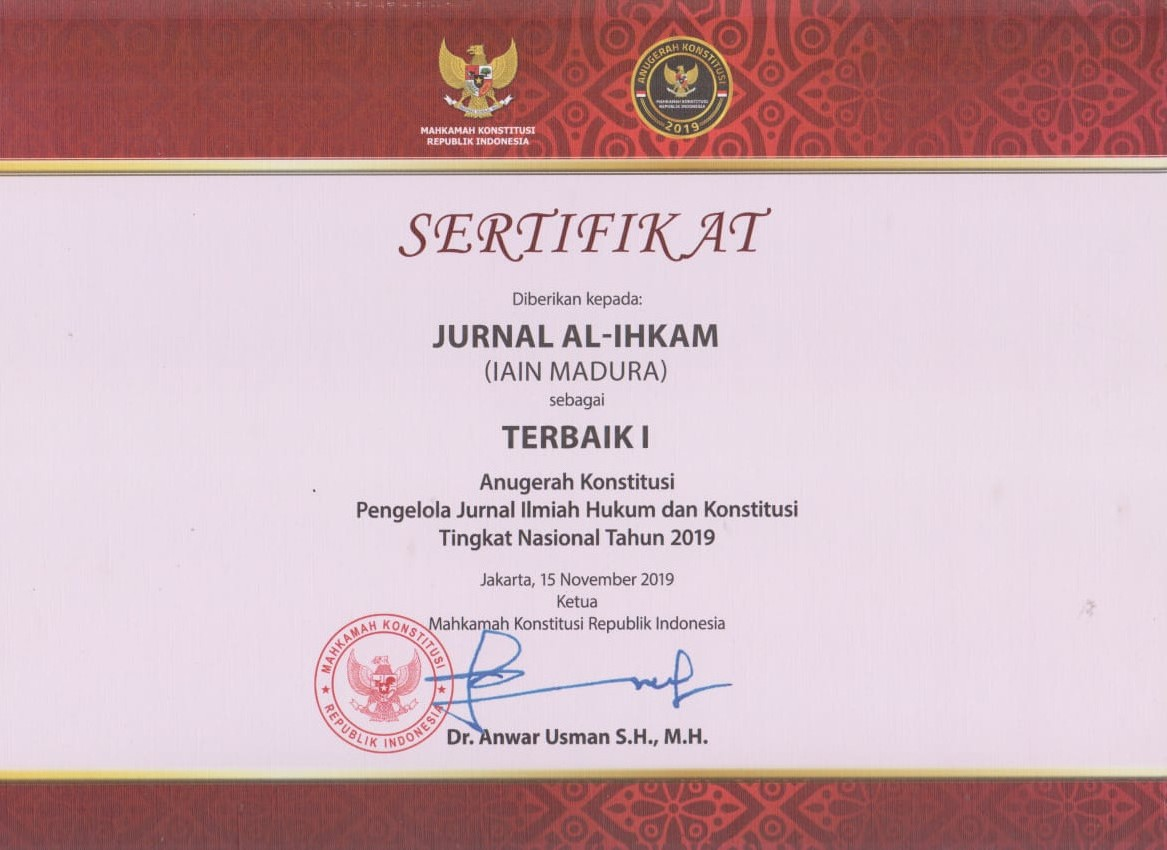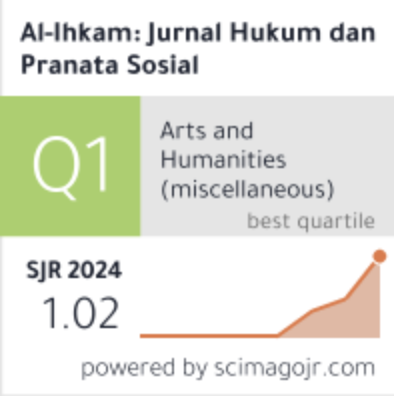Strategic Solutions for Women’s Empowerment through Islamic Social Finance in Light of Maqaŝid Sharia: A Delphi-ANP Approach
 Abstract views: 914
,
Abstract views: 914
,
 PDF downloads: 699
PDF downloads: 699
Abstract
Women in Indonesia continue to face challenges in achieving economic and social independence. In fact, in Islamic law's framework, particularly Maqāṣid Syarī’ah's, Islamic Social Finance (ISF) emerges as a pivotal instrument for advancing women's empowerment. This study aims to identify key problems and strategic solutions for women's empowerment through Islamic social finance while predicting the future direction of empowerment itself. Utilizing the Delphi Analytical Network Process, this research conducted literature reviews, focus group discussions, and expert interviews across academia, practice, and regulatory bodies. The findings highlight critical problems from three dimensions for enhancing women's welfare: women's limited time since they have multiple roles (wife and mother) (0.116), capital provision from Islamic social finance institutions without assistance (0.200), and lack of shared information to muzakkī/donors on the importance of empowering women (0.315). Key strategic solutions include addressing essential needs prior to empowerment (0.054), customizing programs to recipients' interests (0.053), and providing financial literacy training (0.052). For Islamic social finance institutions, priorities include creating a comprehensive empowerment framework (0.137), fostering collaborations (0.128), and enhancing institutional capacities (0.115). Improving funding transparency (0.315) and channeling funds through institutions (0.221) are crucial in donor engagement.
Downloads
References
Aarntzen, Lianne, Belle Derks, Elianne van Steenbergen, Michelle Ryan, and Tanja van der Lippe. “Work-Family Guilt as a Straightjacket. An Interview and Diary Study on Consequences of Mothers’ Work-Family Guilt.” Journal of Vocational Behavior 115, no. August (2019): 103336. https://doi.org/10.1016/j.jvb.2019.103336.
Annan, Jeannie, Aletheia Donald, Markus Goldstein, Paula Gonzalez Martinez, and Gayatri Koolwal. “Taking Power: Women’s Empowerment and Household Well-Being in Sub-Saharan Africa.” World Development 140 (2021): 105292. https://doi.org/10.1016/j.worlddev.2020.105292.
Anwar, Moch Khoirul, Ahmad Ajib Ridlwan, Yan Putra Timur, Tazkiyah Nur Laili Citra Dewi, Juliana Juliana, and Anwar Adem Shikur. “Business Success of Asnāf Women’s Entrepreneur: An Islamic Law Perspective.” Al-Ihkam: Jurnal Hukum Dan Pranata Sosial 19, no. 2 (2024): 1–26. https://doi.org/10.19105/al-lhkam.v19i1.8690.
Ascarya. “Analytic Network Process (ANP): Pendekatan Baru Studi Kualitatif.” Pusat Pendidikan Dan Studi Kebanksentralan, Bank Indonesia, 2005, 1–52.
Atiya, Nikmatul, Tika Widiastuti, Eko Fajar Cahyono, Siti Zulaikha, and Imron Mawardi. “A Techno-Efficiency Analysis of Zakat Institutions in Indonesia.” International Journal of Zakat 5, no. 3 (2020): 30–43. https://doi.org/10.37706/ijaz.v5i3.249.
Barkah, Qodariah, Arne Huzaimah, Siti Rachmiyatun, Andriyani, and Zulmi Ramdani. “Abandonment of Women’s Rights in Child Marriage; An Islamic Law Perspective.” Al-Ihkam: Jurnal Hukum Dan Pranata Sosial 17, no. 2 (2022): 383–411. https://doi.org/10.19105/al-Ihkam.v17i2.6725.
BAZNAS. “BAZNAS : Zakat Masyarakat Yang Tak Tercatat Rp 61,25 Triliun.” BAZNAS, 2020. https://baznas.go.id/Press_Release/baca/BAZNAS_:_Zakat_Masyarakat_yang_Tak_Tercatat_Rp_61,25_Triliun/680.
Brau, James C, Gary M Woller, James C Brau, and Gary M Woller. “Microfinance: A Comprehensive Review of the Existing Literature.” Journal of Entrepreneurial Finance 9, no. 1 (2004): 1–28.
Cabeza-García, Laura, Esther B. Del Brio, and Mery Luz Oscanoa-Victorio. “Female Financial Inclusion and Its Impacts on Inclusive Economic Development.” Women’s Studies International Forum 77, no. October 2018 (2019): 102300. https://doi.org/10.1016/j.wsif.2019.102300.
Chatterjee, Susmita, Sangita Dutta Gupta, and Parijat Upadhyay. “Technology Adoption and Entrepreneurial Orientation for Rural Women: Evidence from India.” Technological Forecasting and Social Change 160, no. August 2019 (2020): 120236. https://doi.org/10.1016/j.techfore.2020.120236.
Cherayi, Shanuga, and Justin P. Jose. “Empowerment and Social Inclusion of Muslim Women: Towards a New Conceptual Model.” Journal of Rural Studies 45 (2016): 243–51. https://doi.org/10.1016/j.jrurstud.2016.04.003.
Czymara, Christian S., Alexander Langenkamp, and Tomás Cano. “Cause for Concerns: Gender Inequality in Experiencing the COVID-19 Lockdown in Germany.” European Societies 23, no. S1 (2021): S68–81. https://doi.org/10.1080/14616696.2020.1808692.
Dahlum, Sirianne, Carl Henrik Knutsen, and Valeriya Mechkova. “Women’s Political Empowerment and Economic Growth.” World Development 156 (2022). https://doi.org/10.1016/j.worlddev.2022.105822.
Direktorat Jenderal Kependudukan dan Pencatatan Sipil (Dukcapil). “Dukcapil: Jumlah Penduduk Indonesia Sebanyak 275,36 Juta Pada Juni 2022.” Databoks.katadata.co.id, 2022. https://databoks.katadata.co.id/datapublish/2022/08/02/dukcapil-jumlah-penduduk-indonesia-sebanyak-27536-juta-pada-juni-2022.
Ennas, Gianfranco, Daria Sarti, Teresina Torre, and Francesco Virili. “Are Sustainable and Innovative Enterprises More Equal in Rewarding Their Women?” Journal of Cleaner Production 422, no. August (2023): 138517. https://doi.org/10.1016/j.jclepro.2023.138517.
Farida, Umma, Abdurrohman Kasdi, and Yuyun Affandi. “The Economic Empowerment of Women in the Hadith and Its Application in the Indonesian Context.” Journal of International Women’s Studies 24, no. 1 (2022): 1–13.
Habeeb, Safoora, Vikas Arya, and Naseeb Ahmad. “Home-Based Entrepreneuring for Empowerment and Sustainability of Muslim Women: A Study in the Indian Context.” World Review of Science, Technology and Sustainable Development 17, no. 4 (2021): 334–47.
Hamdan, Nur Hazirah Binti, and Salina Hj Kassim. “The Effects of Islamic Microfinancing, Human Capital and Ict Usage on Women Microentrepreneurs’ Performance in Malaysia.” Journal of Islamic Monetary Economics and Finance 8, no. February (2022): 125–52. https://doi.org/10.21098/jimf.v8i0.1421.
Hsu, Chia Chien, and Brian A. Sandford. “Minimizing Non-Response in the Delphi Process: How to Respond to Non-Response.” Practical Assessment, Research and Evaluation 12, no. 17 (2007): 1–7. https://doi.org/10.7275/by88-4025.
Jie, Honglan, Shah Zaman, Qamar uz Zaman, Aadil Hameed Shah, and Jie Lou. “A Pathway to a Sustainable Future: Investigating the Contribution of Technological Innovations, Clean Energy, and Women’s Empowerment in Mitigating Global Environmental Challenges.” Journal of Cleaner Production 421, no. August (2023): 138499. https://doi.org/10.1016/j.jclepro.2023.138499.
Kementerian Keuangan Republik Indonesia. “Pemberdayaan Perempuan Untuk Kesetaraan.” Kementerian Keuangan Republik Indonesia, 2022. https://www.djkn.kemenkeu.go.id/kpknl-pontianak/baca-artikel/15732/Pemberdayaan-Perempuan-untuk-Kesetaraan.html.
Kementerian PPPA Republik Indonesia. Laporan Kinerja Instansi Pemerintah-Deputi Bidang Kesetaraan Gender REPUBLIK INDONESIA, 2022.
Kwon, Min, and Hyungseon Kim. “Psychological Well-Being of Female-Headed Households Based on Age Stratification: A Nationwide Cross-Sectional Study in South Korea.” International Journal of Environmental Research and Public Health 17, no. 18 (2020): 1–12. https://doi.org/10.3390/ijerph17186445.
Machín-Rincón, Laritza, Eva Cifre, Pilar Domínguez-Castillo, and Mónica Segovia-Pérez. “I Am a Leader, i Am a Mother, i Can Do This! The Moderated Mediation of Psychological Capital, Work-Family Conflict, and Having Children on Well-Being of Women Leaders.” Sustainability (Switzerland) 12, no. 5 (2020): 1–22. https://doi.org/10.3390/su12052100.
Mawardi, Imron, Tika Widiastuti, and Muhammad Ubaidillah Al Mustofa. “Constraints and Strategies for Municipal Sukuk Issuance in Indonesia.” Journal of Islamic Accounting and Business Research 13, no. 3 (2022): 464–85. https://doi.org/10.1108/JIABR-03-2021-0082.
Morgenroth, Thekla, and Madeline E. Heilman. “Should I Stay or Should I Go? Implications of Maternity Leave Choice for Perceptions of Working Mothers.” Journal of Experimental Social Psychology 72, no. November 2016 (2017): 53–56. https://doi.org/10.1016/j.jesp.2017.04.008.
Nawawi, Zuhrinal M, Andri Soemitra, and Mahfuzah. “Women Economic Empowerment Through Sharia Micro-Finance Institutions in Indonesia: A Qualitative Research.” Iqtishadia 15, no. 2 (2022): 255–72.
Nosheen, Misbah, Javed Iqbal, and Shahzad Ahmad. “Economic Empowerment of Women through Climate Change Mitigation.” Journal of Cleaner Production 421, no. August (2023): 138480. https://doi.org/10.1016/j.jclepro.2023.138480.
Nurasyiah, Aas, Miyasto Miyasto, Tatik Mariyanti, and Irfan Syauqi Beik. “Women’s Empowerment and Family Poverty in the Tawhidi Epistemological Approach.” International Journal of Ethics and Systems 37, no. 1 (2021): 15–34. https://doi.org/10.1108/IJOES-01-2020-0004.
OECD. Women and Financial Literacy. ProLiteracy White Paper, 2013. http://uctioncolor.proliteracy.org/Downloads/ProLiteracy_women-and-financial-literacy.pdf.
Owoyemi, Musa Yusuf. “Zakat Management: The Crisis of Confidence in Zakat Agencies and the Legality of Giving Zakat Directly to the Poor.” Journal of Islamic Accounting and Business Research 11, no. 2 (2020): 498–510. https://doi.org/10.1108/JIABR-07-2017-0097.
Pischke, J. D. Von. “Measuring the Trade-off Between Outreach and Sustainability of Microenterprise Lenders.” Journal of International Development 8, no. 2 (1996): 225–39. https://doi.org/10.1002/(SICI)1099-1328(199603)8:2<225::AID-JID370>3.0.CO;2-6.
Pusat Kajian Strategis - Badan Amil Zakat Nasional. Outlook Zakat Indonesia 2022. Pusat Kajian Strategis – Badan Amil Zakat Nasional (Puskas BAZNAS). Vol. 59, 2022.
Pusat Kebijakan Ekonomi Makro. Kajian Pengarusutamaan Gender Analisis Ketimpangan Gender Spasial Dan Pengaruhnya Terhadap Perekonomian Wilayah. Jakarta: Badan Kebijakan Fiskal, Kementerian Keuangan, 2021.
Ramanayake, Sanika Sulochani, Taniya Ghosh, Sanika Sulochani Ramanayake, and Taniya Ghosh. “Role of Gender Gap in Economic Growth : Analysis on Developing Countries versus OECD Countries Role of Gender Gap in Economic Growth : Analysis on Developing Countries versus OECD Countries,” 2017.
Ryandono, Muhammad Nafik Hadi, Tika Widiastuti, Imron Mawardi, Muhammad Ubaidillah Al Mustofa, Anidah Robani, Sunan Fanani, Eka Puspa Dewi, Nikmatul Atiya, Ega Rusanti, and Mir’atun Nisa’. “Constructing an Environmental, Social, And Governance (ESG) Index for Islamic Social Finance Institutions: Empirical Investigation from Indonesia.” Journal of Ecohumanism 3, no. 4 (2024): 2620–45. https://doi.org/10.62754/joe.v3i4.3781.
Saaty, Thomas, and Luis Vargas. Decision Making with the Analytic Network Process. Economic, Political, Social and Technological Applications with Benefits, Opportunities, Costs and Risks, 2006. https://doi.org/10.1007/0-387-33987-6.
Samier, Eugenie, and Eman Elkaleh. “Towards a Model of Muslim Women’s Management Empowerment: Philosophical and Historical Evidence and Critical Approaches.” Administrative Sciences 11, no. 2 (2021). https://doi.org/10.3390/ADMSCI11020047.
Sawmar, Abdulsalam Ahmed, and Mustafa Omar Mohammed. “Enhancing Zakat Compliance through Good Governance: A Conceptual Framework.” ISRA International Journal of Islamic Finance 13, no. 1 (2021): 136–54. https://doi.org/10.1108/ijif-10-2018-0116.
Shirazi, Farid. “Information and Communication Technology and Women Empowerment in Iran.” Telematics and Informatics 29, no. 1 (2012): 45–55. https://doi.org/10.1016/j.tele.2011.02.001.
Soemitra, Andri, Tri Inda, and Fadhila Rahma. “The Role of Micro Waqf Bank in Women ’ s Micro-Business Empowerment through Islamic Social Finance : Mixed-Method Evidence from Mawaridussalam Indonesia.” Economies 10, no. 7 (2022): 157.
Widiastuti, Tika, Eko Fajar Cahyono, Siti Zulaikha, Imron Mawardi, and Muhammad Ubaidillah Al Mustofa. “Optimizing Zakat Governance in East Java Using Analytical Network Process (ANP): The Role of Zakat Technology (ZakaTech).” Journal of Islamic Accounting and Business Research 12, no. 3 (2021): 301–19. https://doi.org/10.1108/JIABR-09-2020-0307.
Widiastuti, Tika, Imron Mawardi, Al Shami Samer Ali, Nikmatul Atiya, Lina Nugraha Rani, Anidah Binti Robani, and Muhammad Ubaidillah Al Mustofa. “Determinant Factors for Online Cash Waqf Intention among Muslim Millennial Generation.” Journal of Islamic Marketing 16, no. 1 (2024): 258–89. https://doi.org/10.1108/JIMA-12-2023-0408.
Widiastuti, Tika, Sri Ningsih, Ari Prasetyo, Imron Mawardi, Sri Herianingrum, Anidah Robani, Muhammad Ubaidillah Al Mustofa, and Aufar Fadlul Hady. “Developing an Integrated Model of Islamic Social Finance: Toward an Effective Governance Framework.” Heliyon 8, no. 9 (2022): e10383. https://doi.org/10.1016/j.heliyon.2022.e10383.
Widiastuti, Tika, Anidah Robani, Puji Sucia Sukmaningrum, Imron Mawardi, Sri Ningsih, Sri Herianingrum, and Muhammad Ubaidillah Al-Mustofa. “Integrating Sustainable Islamic Social Finance: An Analytical Network Process Using the Benefit Opportunity Cost Risk (ANP BOCR) Framework: The Case of Indonesia.” Plos One 17, no. 5 (2022): e0269039. https://doi.org/10.1371/journal.pone.0269039.
World Bank. “Indonesia Country Gender Assessment: Investing in Opportunities for Women,” 2020.
Zams, Bastian Muzbar, Ratih Indrastuti, Akhmad Ginulur Pangersa, Nur Annisa Hasniawati, Fatimah Az Zahra, and Indah Ayu Fauziah. “Designing Central Bank Digital Currency for Indonesia: The Delphi-Analytic Network Process.” Buletin Ekonomi Moneter Dan Perbankan 23, no. 3 (2020): 411–38. https://doi.org/10.21098/BEMP.V23I3.1351.
Copyright (c) 2025 AL-IHKAM: Jurnal Hukum & Pranata Sosial

This work is licensed under a Creative Commons Attribution-ShareAlike 4.0 International License.
In order to be accepted and published by Al-Ihkam: Jurnal Hukum dan Pranata Sosial, author(s) submitting the article manuscript should complete all the review stages. By submitting the manuscript, the author(s) agreed to the following terms:
- The copyright of received articles shall be assigned to Al-Ihkam: Jurnal Hukum dan Pranata Sosial as the publisher of the journal. The intended copyright includes the right to publish articles in various forms (including reprints). Al-Ihkam: Jurnal Hukum dan Pranata Sosial maintain the publishing rights to the published articles.
- Authors are permitted to disseminate published articles by sharing the link/DOI of the article at Al-Ihkam: Jurnal Hukum dan Pranata Sosial. Authors are allowed to use their articles for any legal purposes deemed necessary without written permission from Al-Ihkam: Jurnal Hukum dan Pranata Sosial with an acknowledgment of initial publication to this journal.
- Users/public use of this website will be licensed to CC-BY-SA.



.png)
_1.png)


_page-00011.jpg)


